National honors pour in for Grinnell faculty members
June 17, 2021 — Grinnell College faculty members have been selected for a number of prestigious awards, fellowships, and scholarly prizes during the last three months. The honors will help advance faculty research projects across several academic disciplines.
“We are delighted to have so many Grinnell College faculty members receive recognition for their scholarly pursuits,” says Elaine Marzluff, interim dean and Breid-McFarland Professor of Science. “To have our faculty honored with some of the most competitive and respected grants and awards speaks to their dedication and the significance of their research. I’m looking forward to seeing how the impact of these awards shape future learning and intellectual engagement.”
Here’s a detailed look at the honors received:
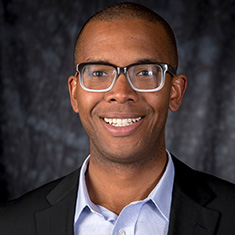 Vance Byrd
Vance Byrd
Byrd, the Frank and Roberta Furbush Scholar and an associate professor of German studies, received a National Humanities Center Fellowship for 2021-22.
The fellowship, which is awarded to scholars in fields across the humanities whose work is shaping the future of their fields, is among the most selective award in the humanities. This year’s class consists of 36 fellows drawn from a pool of 638 applicants.
The award will support Byrd’s work on his second monograph, Listening to Panoramas: Sonic and Visual Cultures of Commemoration. By studying panoramas, a type of art form that combines images with sonic and theatrical components and were widely used in commemoration in the U.S. and Germany, Byrd’s project will provide new insights into the politics of commemoration, race, and national imagination.
Additionally, Byrd was awarded a Humanities Unbounded Visiting Faculty Fellowship from Duke University. He will collaborate with a variety of Duke faculty members as he works on the manuscript for the panoramas project.
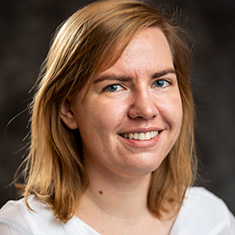 Nicole Eikmeier
Nicole Eikmeier
Eikmeier, an assistant professor of computer science, has been named a Scialog Fellow by the Research Corporation for Science Advancement.
Short for science dialogue, the Scialog program brings interdisciplinary groups of 50 early-career faculty members together around a topic of key scientific importance. Over a three-year period, faculty are provided with guidance from senior facilitators, opportunities to form multidisciplinary collaborations, and seed funding for their research.
Eikmeier was selected for the “Mitigating Zoonotic Threats” Scialog, which will bring together scientists to determine how to detect and mitigate diseases like COVID-19 that leap from animal to human hosts. Last year, Eikmeier and her co-authors received a National Science Foundation Rapid Response Research grant to model the spread of COVID-19 in small colleges.
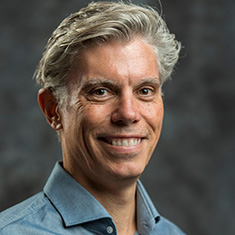 John Garrison
John Garrison
Garrison, a professor of English and chair of the peace and conflict studies concentration, has received a Guggenheim Fellowship and a National Endowment for the Humanities Summer Stipend grant.
The Guggenheim Fellowship is awarded to artists, scholars, and writers who have demonstrated exceptional capacity for productive scholarship or exceptional creative ability in the arts. It’s one of the most selective fellowships in existence. The most recent faculty member to win a Guggenheim while employed at Grinnell was Dan Kaiser in 1985.
Both the fellowship and stipend will support Garrison’s work that explores the interplay between desire and memory in Shakespeare’s poetry. The research uniquely combines perspectives from a variety of disciplines, including the early modern memory arts, neuroscience and psychoanalysis.
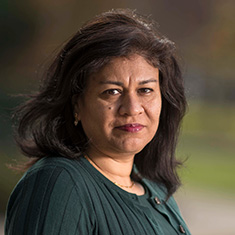 Shuchi Kapila
Shuchi Kapila
Kapila, a professor of English, was awarded in May a Fulbright Scholar grant to travel to India to complete the research for her second book, which is about the Indian partition of 1947. The book will explore the memory of the partition through the memories of survivors, the “postmemory” of the children and grandchildren of survivors, and formal memorialization efforts.
The Fulbright grant support multiple trips to India over a two-year period, which paves the way for Kaplia to conduct interviews with the descendants of partition survivors, revisit the museum of the partition, and collaborate with colleagues in India, particularly scholars at the Center for the Study of Violence, Memory, and Trauma at Delhi University.
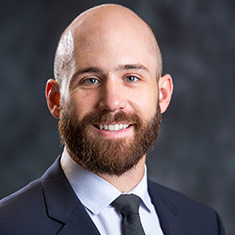 Eric Ohrn ‘07
Eric Ohrn ‘07
Ohrn, an associate professor of economics, has been selected as a 2021-22 visiting scholar for the Opportunity & Inclusive Growth Institute of the Federal Reserve Bank of Minneapolis. This program brings economists who are leaders in their field to study ways to inclusively enhance economic opportunity and well-being. Of the 21 scholars in the 2021-22 cohort, Ohrn is the only one from a liberal arts college.
Ohrn’s project, “How Does Capital Investment Affect Workers? Evidence from Bonus Depreciation and Matched Employer-Employee Data,” examines how bonus depreciation – a tax incentive that decreases the cost of capital investment for firms – affects workers. He will look at questions like how firms’ investments in automation and industrial robots affect workers’ earnings and what happens to workers who are displaced when their workplaces invest in automation.
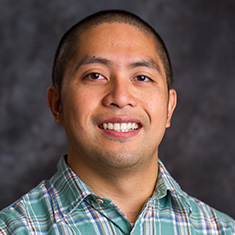 Peter-Michael Osera
Peter-Michael Osera
Osera, an assistant professor of computer science, recently received a $524,611 Faculty Early Career Development (CAREER) grant from the National Science Foundation (NSF). A teacher-scholar grant, CAREER Awards are the most prestigious and competitive grants the NSF awards to early career faculty.
The grant will support Osera’s project “Foundations and Applications of Constraint-based Synthesis.” Program synthesis is an array of techniques used to automatically generate computer programs. Osera’s project will provide a unifying framework for the wide array of program synthesis techniques that have arisen over the past two decades. This framework will clarify their theoretical underpinning and pave the way for improved, next-generation tools.
CAREER grants always include both research and educational components. Osera’s project will help him further develop his seminar on human-centered programming. He also will focus on discrete mathematics, a second-year course in the computer science curriculum that many students struggle with. In addition, this grant also will provide research training opportunities – including domestic or international conference travel – for at least 10 Grinnell College students.
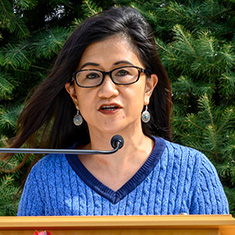 Sharon Quinsaat
Sharon Quinsaat
Quinsaat, an assistant professor of sociology, has received the American Association of University Women’s American Postdoctoral Fellowship. This grant will allow Quinsaat to complete her book, Contentious Migrants: How Protests Create a Filipino Diaspora, which is currently under contract with the University of Chicago Press.
Quinsaat’s research argues that diasporas are more than simply natural outcomes of mass migration – they are formed when migrants develop a sense of collective identity through activism. Her book analyzes the role that three transnational social movements played in constructing the Filipino diaspora and draws upon archival and ethnographic research among Filipino communities in the U.S. and the Netherlands.
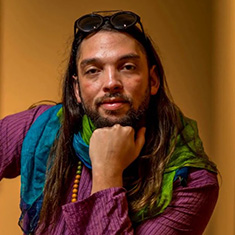 Fredo Rivera ’06
Fredo Rivera ’06
Rivera, an assistant professor of art history, has received a six-month Career Enhancement Fellowship from the Institute for Citizens and Scholars. Funded by The Andrew W. Mellon Foundation, the fellowships are meant to increase the presence of underrepresented early-career faculty members in humanistic fields by providing them with time to complete major research projects.
Rivera will use the fellowship to complete his book project, Within the Revolution: Art, Media & the Built Environment in 1960s Cuba. The award recognizes both the promise of this project and the significant contributions Rivera has made to diversity and to eradicating racial and other disparities – through his teaching; creative collaborations with the Grinnell College Museum of Art; community-building for faculty, staff, and students of color; and his work engaging broader publics including collaboration on Haitian art with the Waterloo Center for the Arts as well as curating queer performative art events in Miami.
Dustin Dixon, Patrick Inglis, Mark Laver, and Sejal Sutaria
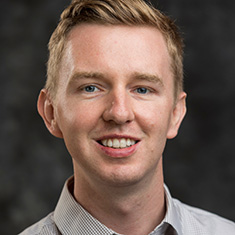 Dustin Dixon
Dustin Dixon
 Patrick Inglis
Patrick Inglis
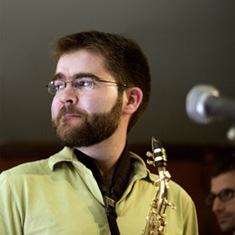 Mark Laver
Mark Laver
 Sejal Sutaria
Sejal Sutaria
Four Grinnell College faculty members have received Franklin Research Grants from the American Philosophical Society:
Dixon, an assistant professor of classics, is working on project titled, “Myth and the Craft of Comedy in Ancient Greece and Rome.” In addition to the Franklin grant, a grant from the Loeb Classical Library Foundation is allowing Dixon to conduct research at the Institute for Classical Studies in London. He will draw on texts and material and visual culture, using items drawn from the institute’s holdings to show how comedy enriched ancient societies and today’s understanding of myth.
Inglis, an assistant professor of sociology, received a Franklin grant to advance his second book project, “Paying It Forward: The Promise and Burden of a Good Education.” The project is a longitudinal study of Shanti Bhavan, a K-12 boarding school that provides a high-quality education for poor Dalit children in south India. Through this lens, Inglis investigates fundamental questions in educational philanthropy.
Laver, an associate professor of music, received a Franklin grant to complete a biography of Phil Nimmons, a Canadian musician, composer, and educator known as the Dean of Jazz. Lavar’s project, “Nufsicisum (Music Is Fun): The Life and Music of Phil Nimmons,” will chronicle the remarkable life of the 97-year-old Nimmons, simultaneously shining a light on an under-studied figure in Canadian music and contributing to a growing literature on the transnationalism of jazz.
Sutaria, an assistant professor of English, received a Franklin grant in support of her book project Making Waves: Britain, India and the Sounding of Postcolonial Resistance. Sutaria’s research explores how Indian, Pakistani, and British writers of South Asian descent deployed BBC radio broadcasts and representations of sound in literary texts to confront anti-immigrant racism in Britain in the mid- to late-20th century.
— by Jeremy Shapiro